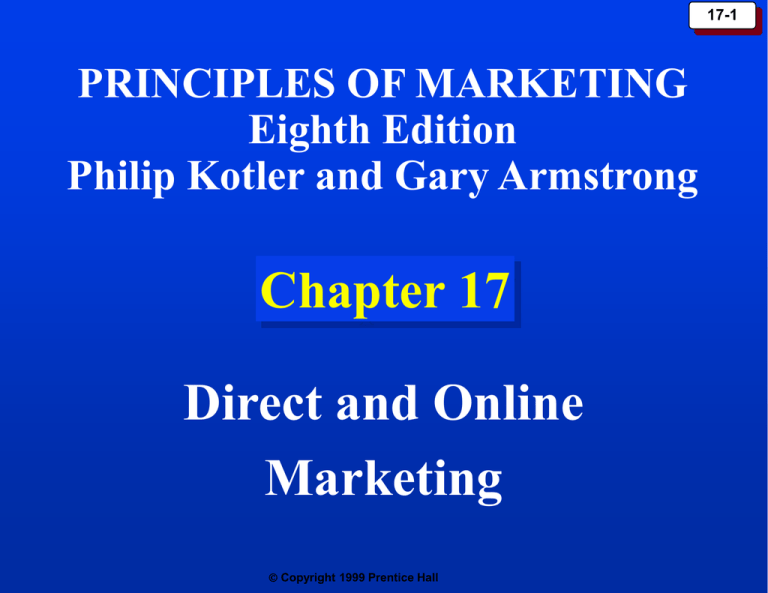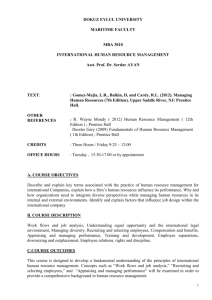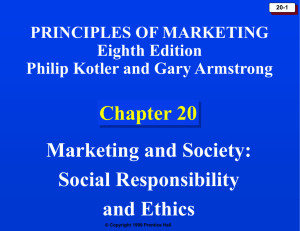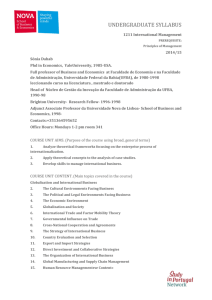Chapter 17: Direct and Online Marketing
advertisement

17-1 PRINCIPLES OF MARKETING Eighth Edition Philip Kotler and Gary Armstrong Chapter 17 Direct and Online Marketing Copyright 1999 Prentice Hall 17-2 Benefits of Direct Marketing Direct Marketing Consists of Direct Communications with Carefully Targeted Individual Consumers to Obtain an Immediate Response. Benefits of Direct Marketing to Customers Benefits of Direct Marketing to Companies Fun, Convenient & Hassle-Free Mailing Lists for Almost Any Market Saves Time Customized Offers Larger Merchandise Selection Ongoing Relationships with Customers Comparison Shopping Timed to Achieve Higher Readership & Response Order Products for Themselves or Others Privacy Copyright 1999 Prentice Hall Trends Leading to the Growth of Direct Marketing 17-3 Increasing Number of Market Niches with Distinct Preferences Higher Costs of Driving, Traffic and Parking Congestion Consumers Lack of Time Convenience of Ordering From Direct Marketers Growth of Customer Databases Copyright 1999 Prentice Hall Customer Databases and Direct Marketing Customer Databases are an Organized Collection of Comprehensive Data About Individual Customers or Prospects Including: Geographic, Demographic, Psychographic, and Behavioral Data. How Companies Use Their Databases Identifying Prospects Deciding Which Customers Should Receive a Particular Offer Deepening Customer Loyalty Reactivating Customer Purchases Copyright 1999 Prentice Hall 17-4 17-5 Forms of Direct Marketing Communication Face-to-Face Selling Online Marketing Direct-Mail Marketing Kiosk Marketing Catalog Marketing Direct-Response TV Marketing Copyright 1999 Prentice Hall Telemarketing Online Marketing and Electronic Commerce 17-6 • Online Marketing is conducted through interactive online computer systems, which link consumers with sellers electronically. • Two types of Online Marketing Channels: – Commercial Online Services offer online information and marketing services to subscribers who pay a monthly fee. (i.e. AOL, CompuServe & Prodigy) – The Internet (the Net) is the vast global and public web of computer networks. • The explosion of Internet usage has created a new world of electronic commerce, a term that refers to the buying and selling process supported by electronic means. Copyright 1999 Prentice Hall The Benefits of Online Marketing Consumers Companies Convenient Consumer Relationship Building Private Reduces Costs Abundance of Information Increases Efficiency Interactive Provides Flexibility Immediate Global Medium Copyright 1999 Prentice Hall 17-7 Online Marketing Channels 17-8 Creating an Electronic Storefront Buy Space on a Commercial Online Service Open It’s Own Web Page Placing Advertisements Online Place Ads in Special Sections of Online Services Place Ads in Certain Internet Newsgroups Buy Online Ads That Pop Up While Consumers are Surfing Participating in Forums, Newsgroups & Web Communities Forums: Discussion Groups on Commercial Online Services Newsgroups: Internet Version of Forums Web Communities: Sites Where Members Exchange Views Online Using E-Mail and Webcasting Customers Send Questions, Suggestions & Complaints Via E-Mail Webcasting: Automatic Downloading of Information to PC’s Copyright 1999 Prentice Hall Challenges of Direct Marketing Limited Consumer Exposure and Buying Skewed User Demographics and Psychographics Chaos and Clutter Security Ethical Concerns Copyright 1999 Prentice Hall 17-9 Integrated Direct Marketing • Direct marketing campaigns that use multiple vehicles and multiple stages to improve response rates and profits. • Marketers seek to improve response rates and profits by adding media and stages that contribute more to additional sales than to additional costs. Copyright 1999 Prentice Hall 17-10 Public Policy and Ethical Issues in Direct Marketing Unfairness, Deception, or Fraud Irritation to Consumers Invasion of Privacy Copyright 1999 Prentice Hall 17-11






